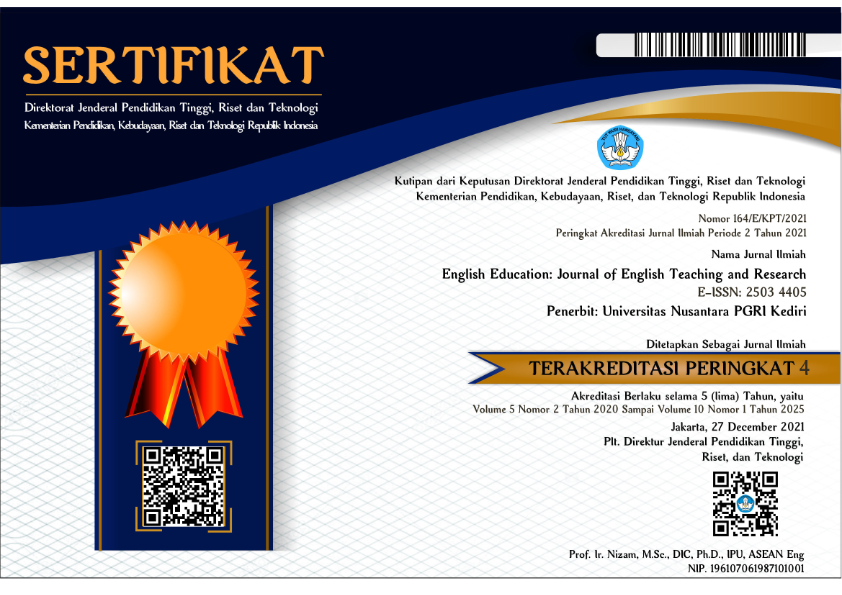English Education Students’ Challenges Integrating Literature in Theses
DOI:
https://doi.org/10.29407/jetar.v10i2.26557Keywords:
Literature Integration; Thesis Writing; English Language Education; Academic Challenges; AI in Academia., academic challenges, thesis writing, literature integration, English Language Education, AI in academiaAbstract
The study addresses the pervasive difficulties students encounter in locating appropriate, current, and topic-specific literature, synthesizing existing research with their own arguments, maintaining narrative cohesion, and navigating the complexities of the literature review chapter. A significant concern is the increasing reliance on AI tools and the associated ethical considerations. This research aims to identify and examine the specific challenges of English language Education students face in integrating literature sources, such as improper paraphrasing, overreliance on direct quotations, ineffective synthesis, and limited understanding of citation conventions. It also seeks to explore underlying causes like insufficient academic writing training, low language proficiency confidence, and lack of familiarity with scholarly literature. A qualitative narrative inquiry approach was employed, involving semi-structured interviews with four eighth-semester undergraduate students from the English Language Education Department. Data were analyzed using narrative analysis to understand participants' experiences, perceptions, and strategies in navigating literature integration challenges. Trustworthiness was the validation variable used in this investigation. Findings reveal that students struggle with finding relevant sources, adjusting quotes to fit personal arguments, and maintaining narrative cohesion, with the literature review consistently identified as the most challenging section. While AI tools like ChatGPT are perceived as effective for efficiency and ideal generation, ethical considerations regarding plagiarism are crucial. Students effectively use conceptual maps and matrices for organization. The study concludes with a strong demand for practical support, including workshops and resources, to enhance literature integration skills, emphasizing the urgent need for targeted pedagogical interventions to improve thesis quality.
Downloads
References
Andersen, I. G., & Jæger, M. M. (2020). Positioning Gestalt Professional Education in the Changing Cultural Context: the Experiences of Providers. Thesis Submitted for the Degree of Doctor Philosophy School of Education and Professional Studies Arts, Education and Law Griffith University. https://www.researchgate.net/publication/350145018
Bawden, D., & Robinson, L. (2008). The dark side of information: Overload, anxiety and other paradoxes and pathologies. Journal of Information Science, 35(2), 180–191. https://doi.org/10.1177/0165551508095781
Booth, W. C., Colomb, G. G., Williams, J. M., Bizup, J., & FitzGerald, W. T. (2016). The Craft of Research, Fourth Edition. In The Craft of Research, Fourth Edition. https://doi.org/10.7208/chicago/9780226239873.001.0001
Creswell, D. (2018). Research Design: Qualitative, Quantitative, and Mixed Methods Approaches. In Writing Center Talk over Time. https://doi.org/10.4324/9780429469237-3
Del, I., & García, V. (2025). Reflections on ChatGPT in the field of Social Sciences : A Bibliometric Study. The European Educational Researcher. https://doi.org/10.31757/euer.812
Dina, Y. (2023). Efl Undergraduate Students’ Difficulties in Writing Literature Review of Their Thesis. JELT (Jambi-English Language Teaching), 7(2), 79–86. https://doi.org/10.22437/jelt.v7i2.14057
Enworo, O. C. (2023). Application of Guba and Lincoln’s parallel criteria to assess trustworthiness of qualitative research on indigenous social protection systems. Qualitative Research Journal, 23(4), 372–384. https://doi.org/10.1108/QRJ-08-2022-0116
Chukwuere, J. E. (2023). Exploring Literature Review Methodologies in Information Systems Research: A Comparative Study. Education & Learning in Developing Nations (ELDN)1(2) https://doi.org/10.26480/eldn.02.2023.74.82
Finlay, J., & dela Cruz, A. (2023). Reflexivity and Relational Spaces: Experiences of Conducting a Narrative Inquiry Study With Emerging Adult Women Living With Chronic Pain. Global Qualitative Nursing Research, 10. https://doi.org/10.1177/23333936231190619
Grabe, W., & Zhang, C. (2016). Reading-writing relationships in first and second language academic literacy development. Language Teaching, 49(3), 339–355. https://doi.org/10.1017/S0261444816000082
Smith, B. (2018). Doing a Literature Review Releasing the Social Science Research Imagination (p. 240). London: Sage. https://doi.org/10.1177/1750458918810149
Jerger, S. (2004). The craft of research: What’s in it for you? In Ear and Hearing (Vol. 25, Issue 5). https://doi.org/10.1097/00003446-200410000-00001
Hammond, M (2022). Writing a Postgraduate Thesis for Dissertation: Tools for success. Routledge. In Guide to the Successful Thesis and Dissertation. https://doi.org/10.4324/9781003161820
Meraz, R. L., Osteen, K., & McGee, J. (2019). Applying Multiple Methods of Systematic Evaluation in Narrative Analysis for Greater Validity and Deeper Meaning. International Journal of Qualitative Methods, 18, 1–6. https://doi.org/10.1177/1609406919892472
Pennycook, A. (1996). Borrowing Others’ Words: Text, Ownership, Memory, and Plagiarism. TESOL Quarterly, 30(2), 201. https://doi.org/10.2307/3588141
Rahayu, E. Y., & Moesarofah, M. (2023). The Solutions of Writing Undergraduate Thesis: A Narrative Inquiry Case Study. Linguistics and ELT Journal, 10(2), 57. https://doi.org/10.31764/leltj.v10i2.11987
Ramage, J. D., Bean, J. C., & Johnson, J. (2016). Writing Arguements: A Rhetoric With Readings. https://www.researchgate.net/publication/344120451_Writing_Arguments_A_Rhetoric_with_Readings_10th_ed
Ranjit, K. (2019). Research Methodology: A Step-by-Step Guide for Beginners. In Sage (pp. 1–755). Thousand Oaks, CA: Sage. https://www.scribd.com/document/573920426/Research-Methodology-Ranjit-Kumar
Rifai, I., Nurbani, A. N., & Bachtra, J. (2024). EFL Learners’ Stories in Essay Writing: A Narrative Analysis. PANYONARA: Journal of English Education, 6(2), 25–42. https://doi.org/10.19105/panyonara.v6i2.12668
Swales, J. M., & Feak, C. B. (1995). Academic writing for graduate students. English for Specific Purposes, 14(2), 175–179. https://doi.org/10.1016/0889-4906(95)90003-9
Downloads
Published
Issue
Section
License
Copyright (c) 2025 Nisa Arrizki, Aang Fitro Hidayat, Armelia Nungki Nurbani

This work is licensed under a Creative Commons Attribution-ShareAlike 4.0 International License.
Authors who publish with this journal agree to the following terms:
- Copyright on any article is retained by the author(s).
- The author grants the journal, the right of first publication with the work simultaneously licensed under a Creative Commons Attribution License that allows others to share the work with an acknowledgment of the work’s authorship and initial publication in this journal.
- Authors are able to enter into separate, additional contractual arrangements for the non-exclusive distribution of the journal’s published version of the work (e.g., post it to an institutional repository or publish it in a book), with an acknowledgment of its initial publication in this journal.
- Authors are permitted and encouraged to post their work online (e.g., in institutional repositories or on their website) prior to and during the submission process, as it can lead to productive exchanges, as well as earlier and greater citation of published work.
- The article and any associated published material is distributed under the Creative Commons Attribution-ShareAlike 4.0 International License








 Article template
Article template



